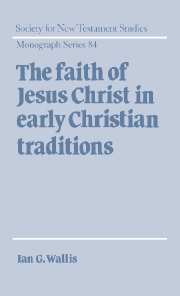Book contents
- Frontmatter
- Contents
- Preface
- Convention for referring to primary and secondary literature
- List of abbreviations
- 1 Setting the scene
- 2 Jesus' faith in the Synoptic Gospels
- 3 Jesus' faith in the Pauline Epistles
- 4 Jesus' faith in the deutero-Pauline and Pastoral Epistles
- 5 Jesus' faith in Hebrews and Revelation
- 6 Jesus' faith in extra-biblical sources
- 7 Concluding remarks
- Select bibliography
- Index of modern authors
- Index of passages
- Index of subjects
6 - Jesus' faith in extra-biblical sources
Published online by Cambridge University Press: 22 September 2009
- Frontmatter
- Contents
- Preface
- Convention for referring to primary and secondary literature
- List of abbreviations
- 1 Setting the scene
- 2 Jesus' faith in the Synoptic Gospels
- 3 Jesus' faith in the Pauline Epistles
- 4 Jesus' faith in the deutero-Pauline and Pastoral Epistles
- 5 Jesus' faith in Hebrews and Revelation
- 6 Jesus' faith in extra-biblical sources
- 7 Concluding remarks
- Select bibliography
- Index of modern authors
- Index of passages
- Index of subjects
Summary
Preliminary considerations
Our review of the New Testament is now largely complete and in this chapter we shall extend our investigation to other early Christian sources. Before proceeding in this way, however, we need to explain why the evidence from the Letter of James has been excluded from our biblical survey. At the beginning of chapter 2, James points out that practising favouritism (προσωπολημψίαις) is incompatible with τὴν πὶστιν τοῦ κυρίου ἡμῶν Ἰησοῦ χριστοῦ τῆς δόξης (2.1). In the light of what has been said about πίστις χριστοῦ in Paul and similar formulations in Ephesians and Revelation, this appears to be another occurrence of the subjective genitive denoting the faith of Christ. No doubt, this is a viable interpretation and one which is favoured by similar constructions elsewhere in the letter, together with the rare reference here to the person of Jesus (cf. 1.1). Yet these factors must be weighed against others. For instance, although much of the teaching and exhortation in James is reminiscent of the Synoptics, Jesus is never cited as a paradigm for the essentially practical understanding of faith espoused by the letter; rather, Abraham and Rahab are the exemplars of faith (2.21–5), Job and the prophets of suffering (5.10–11), and Elijah of prayer (5.17–18). There is, then, nothing in the letter which gives meaning or substance to the faith of Christ, if alluded to in 2.1.
- Type
- Chapter
- Information
- The Faith of Jesus Christ in Early Christian Traditions , pp. 175 - 212Publisher: Cambridge University PressPrint publication year: 1995



